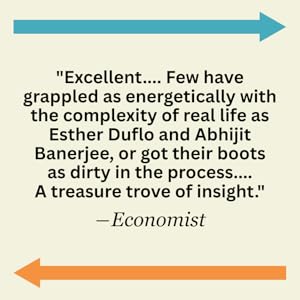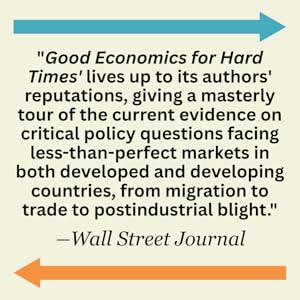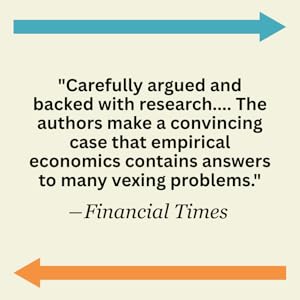Customer Services
Copyright © 2025 Desertcart Holdings Limited


Full description not available



J**S
A brilliant read!
This book arrived a little late but I’ll still give 5 stars based on the content for the authors sake and not the sellers.Firstly the edition of this book is one of the nicest I’ve held recently, it’s a really nice paper bound hardback, the paper is high gsm and feels really nice to touch.This is the second book I’ve read on economics from someone who had no real understanding beforehand, I bought it as it was one of the bill gates summer reading list books, really glad I bought it!The book starts off with talking about the public perception of economists and how there is a large distrust, usually pedalled by ‘bad economics’ and politicians.Some fascinating things I’ve learned since reading:- Economics is not a perfect science, it’s hard to compare data between countries and periods in time, however most often things improve because we learn from past mistakes (e.g. the Great Depression).- Immigration IS a good thing, the argument that the more people arrive to our developed countries the more people are out of work as the supply demand model would indicate, though this isn’t true as when people move to a new location for work, they earn a wage, pay tax and then spend their money on the local economy which boosts growth. Though remittance has a negative effect on the economy.- Interesting points about the efficiency wage, generally most employers won’t pay minimum wage and there is no evidence that most of them do due to the fact that it’s often costlier to keep re-hiring new people and they would rather pay a better wage and keep the employee.- Fascinating comparisons between western economics (mostly focusing on France the U.K. and the states) vs China and India’s economies.- Lower paid workers in SE and developing countries aren’t necessarily worse off, i.e if you stop buying cheap goods for moral reasons you’re reducing the income to these countries and families. Actually the more we spend having products manufactured in the developing world the more the inflow of cash and so the higher the standard of living for the residents. This is seen in China which less than 100 years ago experienced extreme famine under the Mao regime, now the huge growth (The China Shock) is seeing China moving away from large scale cheap labour manufacturing and more into new growth areas in tech (think Huwawie, Zoom and TikTok).- Interesting reads on automation and the replacement of humans in the workforce. As someone that works in the tech sector this really made me revaluate things. Simply put, some jobs can be replaced by machines but it’s not necessarily a good thing to do so. Companies would opt to do this for cost saving reasons, however doing this would cause a huge slump in the labour market. I.e poorer people would be out of work and therefore not paying tax, or claiming welfare and not spending much on the local economy. The results being the companies get bigger and richer but the people don’t. Some predictions actually say large scale automation would have a negative effect on GDP. Fascinating chapter.Last chapter (and I’ve not mentioned them all such as likes wants and needs, climate change and trade) was about universal basic income. This is relatively new turf but I think we’ll see a lot more of it in the future. Essentially people would get a guaranteed income regardless of their employment status. This is fascinating as it eliminates the survival instinct for work, meaning people would be less risk averse in their job often coming up with newer riskier ideas etc. Which is essential for growth (as shown by the Solow model). An interesting concept exists in Denmark called Flexicurity, whereby workers don’t have job security and companies can fire people without legal protection but they automatically receive UBI if they are found out of work. This in essence allows businesses to refine and streamline their business models and allows workers to move onto other work. In essence it’s the complete opposite of a ‘job for life’ mentality which Japan proved doesn’t work that well in the 1990s.I’m going to end this review here but thanks for reading all this if you have!! I’ve actually been inspired to start studying economics with the open university as a result of reading this book. Thanks very much to Abhijit and Esther for their work on this!!
O**S
What needs to change in our world and how...
‘Good Economics’ is an enjoyable and engaging book that anyone with an interest in socio/political/economic affairs will find interesting to read. Take it as read, this not a book that admires of libertarian style readers will appreciate. The authors feel that the state – with is power to legislate, tax and subsidise and promote activities that the free market might otherwise ignore, is a powerful tool for delivering useful social outcomes. (examples: less pollution/improved social and occupational mobility and more efficient land use) l Even more important is the fact that states need to collaborate much more with each other in order create gains not just for the ‘elites’ but for all citizens, who and wherever they are. But this not an old fashioned centralist ‘big government’ line of argument. Rather, that the markets need to regulated or in some cases cajoled to be more efficient in order to deliver gains that can generate socially optimised outcomes. So, looking at areas such as patents, land rights, universal income, employment and training subsidies, information provision and ‘nudges’ to change business and consumer behaviour in appropriate ways.The book is based around three basic viewpoints. Firstly, that there are ever widening gaps between the rich and the poor and this has led a breakdown of trust in institutions, the democratic process and the diminishing sense of common ground between citizens. Secondly, that the world is changing and we need to adapt to the new realities – from climate change, the implications of increased robotic technology and the impacts on labour market, to poverty and the resulting economic migration are but a few of the issues that the authors rightfully consider need our prompt attention. Thirdly, that economics can help provide some of the policy answers to the problems with which it is currently afflicted. The authors though recognise that change will not happen unless leaders/politicians and the populations they are there to serve are convinced that the policies suggested can be seen to ‘work’ and not seen as discriminatory or there to promote sectional interests only.The authors have a basic approach that seems faint –hearted at first, but is actually nuanced and mature in outlook. Banerjee and Dufflo suggest that whatever policies are enacted in a particular field, research has to be undertaken to ascertain that the projected outcomes are likely to happen. Also, that changes in economic policy have done with the understanding and cooperation of those people who are to be affected (particularly in aid /regional regeneration projects). Finally, that no one policy approach will be sufficient to engender change- governments have got to be creative and multi –dimensional in their approach (this suggests ‘joined up thinking’).In all, a very timely book. Highly recommended.
J**.
I'm glad I read this book
Although it was a bit heavy going at times, with big concepts to grasp, it was ultimately worth it. Unless you're already well versed in economics, I would recommend small chunks, often, rather than a whole chapter or two at a time.Perhaps a bit left of centre politically, but always ready to give both sides to the story.
C**R
Useful book
This is a useful book of ideas whatever your politics or country.
M**D
Perfect
Brand new, well packaged
J**N
Important content - easy to read
The authors, Nobel prize winners, are empiracists, rather than orthodox or heterodox economists. They are looking to see what actually works - or more usually, doesn't. I borowed it from my library on the strength of a Guardian review and have now downloaded it for easy reference.
I**E
Good
Good book
A**R
beautiful
very good book
Trustpilot
3 weeks ago
2 weeks ago